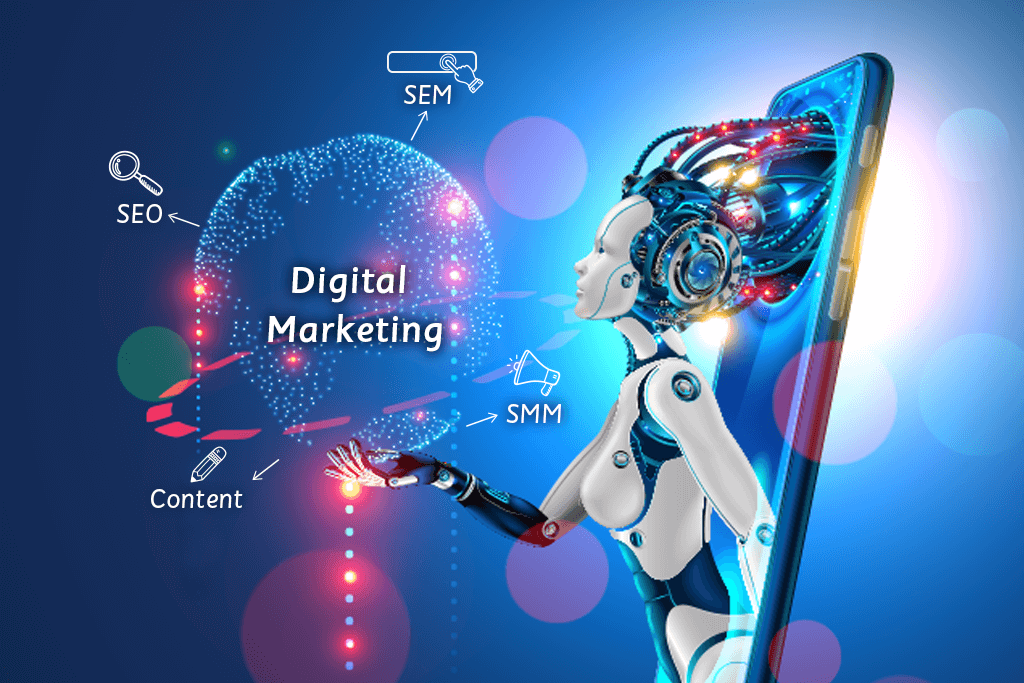In today’s fast-paced digital world, businesses must stay ahead of the competition to thrive. The rapid growth of artificial intelligence (AI) has made it possible for marketers to work smarter, not harder. AI tools for marketing have become indispensable in optimizing strategies, improving customer experience, and boosting ROI (Return on Investment). From automating repetitive tasks to predicting consumer behavior, AI is transforming the marketing landscape in ways that were once unimaginable. This article explores the different types of AI tools available for marketing, how they can benefit businesses, and how companies can integrate them effectively into their strategies.
What Are AI Tools for Marketing?
AI tools for marketing are software applications powered by artificial intelligence technologies, such as machine learning, natural language processing (NLP), predictive analytics, and automation. These tools help marketers enhance their decision-making, streamline tasks, personalize customer interactions, and measure the effectiveness of their campaigns in real-time.
The rise of AI in marketing is largely due to its ability to analyze vast amounts of data quickly, identify patterns, and offer insights that were previously difficult to obtain. Marketers can use these insights to make more informed decisions, deliver personalized content, and improve engagement rates.
Key Benefits of AI Tools in Marketing
The integration of AI tools in marketing strategies offers a plethora of advantages that can significantly impact a business’s success. Here are some of the most notable benefits:
1. Enhanced Personalization
One of the main reasons AI tools are so effective in marketing is their ability to provide hyper-personalized experiences for customers. By analyzing consumer data—such as browsing history, past purchases, and social media interactions—AI algorithms can create tailored recommendations and offers.
For example, e-commerce platforms use AI-powered tools to suggest products based on a customer’s previous searches or purchase behavior, enhancing the likelihood of conversion. Personalized emails, ads, and content based on individual preferences foster a deeper connection with the brand, driving customer loyalty.
2. Improved Customer Insights
AI tools can process large amounts of data to identify trends and customer behavior patterns that humans might overlook. By collecting and analyzing data from various touchpoints, AI can segment customers based on their interests, demographics, and purchasing behaviors. This helps marketers better understand their target audience and craft more effective campaigns.
For instance, AI-based analytics tools like Google Analytics or Adobe Analytics can provide detailed reports on consumer interactions, engagement levels, and conversion rates, allowing marketers to optimize campaigns for higher performance.
3. Automation of Time-Consuming Tasks
AI tools can automate various repetitive and time-consuming tasks that are part of marketing workflows. These tasks include data entry, email marketing, social media scheduling, and even customer support. By automating these processes, marketers can focus more on strategy and creativity.
For example, AI-powered chatbots can handle basic customer inquiries, provide support, and guide customers through the buying process, 24/7. This not only improves customer satisfaction but also reduces the need for human intervention, leading to cost savings.
4. Predictive Analytics
Predictive analytics is one of the most powerful applications of AI in marketing. AI tools can analyze historical data to predict future outcomes, such as customer behavior, product demand, and market trends. By understanding these patterns, businesses can anticipate customer needs and optimize their marketing strategies.
For example, predictive models can identify potential high-value customers, forecast sales trends, and even determine the best time to launch a new product or run a promotional campaign. This ability to predict future events with high accuracy empowers marketers to take proactive measures.
5. Real-Time Decision Making
AI tools can provide real-time insights that allow marketers to make faster, more informed decisions. Whether it’s adjusting a digital ad campaign or tweaking an email marketing strategy, AI tools can offer instant feedback on campaign performance. This enables marketers to test, learn, and refine their approaches continuously.
For example, AI-based tools such as Adobe Sensei can analyze customer interactions on websites and adjust content in real-time based on their behavior, optimizing the user experience and increasing engagement.
Popular AI Tools for Marketing
As AI technology continues to evolve, marketers now have access to a wide range of tools designed to optimize their campaigns. Below are some of the most popular AI tools used in marketing:
1. Chatbots and Virtual Assistants
Chatbots powered by AI are a game-changer for businesses looking to improve customer service and lead generation. These virtual assistants can answer customer inquiries, provide product recommendations, and guide users through the purchasing process. Popular platforms like Drift, Intercom, and LiveChat offer AI-driven chatbots that help businesses engage with customers more efficiently.
2. Email Marketing Automation
AI tools in email marketing help marketers create personalized email campaigns based on customer data. Platforms like Mailchimp, ActiveCampaign, and SendGrid use AI to segment audiences, schedule emails for optimal times, and personalize subject lines and content for higher open rates and engagement. These platforms also offer A/B testing and predictive analytics to improve the effectiveness of email campaigns.
3. Social Media Analytics and Management Tools
Social media marketing is another area where AI tools are making a significant impact. AI-powered platforms like Hootsuite, Sprout Social, and Buffer help businesses schedule posts, track performance, and analyze audience engagement. These tools use AI to determine the best times to post and even suggest content based on trends and audience preferences.
4. Customer Relationship Management (CRM) Software
AI-powered CRM systems such as Salesforce and HubSpot offer marketing automation features, helping businesses manage customer interactions and improve lead conversion. These systems use AI to analyze customer data, track behavior, and automate tasks such as follow-ups, allowing marketers to build more meaningful relationships with clients.
5. Predictive Analytics and Lead Scoring Tools
AI-driven predictive analytics tools, such as Pega, Act-On, and InsideSales, help businesses predict future customer behavior and assess lead quality. These tools analyze past interactions, demographic data, and behavioral patterns to assign lead scores and identify high-value prospects. Marketers can then prioritize leads and tailor their efforts for better conversion rates.
6. Content Creation and Optimization Tools
AI tools like Copy.ai, Jasper, and Writesonic assist in generating content for blogs, social media, and email campaigns. These tools can write articles, create ad copy, and even suggest content topics based on current trends and audience preferences. Additionally, platforms like Clearscope and MarketMuse use AI to optimize content for SEO by identifying high-performing keywords and improving content structure.
How to Integrate AI Tools into Your Marketing Strategy
Integrating AI tools into your marketing strategy requires careful planning and alignment with business goals. Here are some steps to help businesses make the most of AI-powered marketing tools:
1. Define Clear Objectives
Before diving into AI, it’s important to define clear marketing objectives. Whether it’s increasing website traffic, improving customer engagement, or boosting conversions, having specific goals will guide your AI tool selection and implementation strategy.
2. Choose the Right AI Tools
Selecting the right AI tools is crucial for success. Consider factors such as ease of integration, scalability, and the specific tasks you want to automate or improve. Start with tools that address your most immediate needs, and gradually expand as you become more comfortable with AI technology.
3. Collect and Analyze Data
AI tools rely on data to deliver insights and make predictions. Collect customer data from various sources such as your website, social media channels, and CRM system. Ensure the data is clean, organized, and up-to-date so that the AI tools can function effectively.
4. Monitor and Optimize Performance
Once you’ve implemented AI tools, it’s essential to continuously monitor performance. Use the insights provided by these tools to tweak and optimize your marketing efforts. AI-driven marketing is an ongoing process of testing, learning, and refining.
Conclusion
AI tools for marketing are not just a passing trend; they represent the future of digital marketing. By harnessing the power of AI, businesses can improve personalization, enhance customer experience, automate time-consuming tasks, and make data-driven decisions. The tools available today can provide marketers with real-time insights and predictive analytics that enable them to stay ahead of the competition.
As the AI landscape continues to evolve, companies that adopt and integrate AI tools into their marketing strategies will be better equipped to drive growth, improve customer satisfaction, and increase ROI. AI is no longer a luxury for large corporations; it is a necessity for businesses of all sizes aiming to remain competitive in the ever-changing digital world. Read More….


